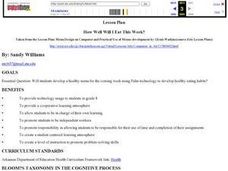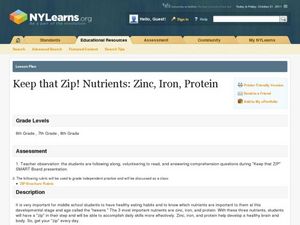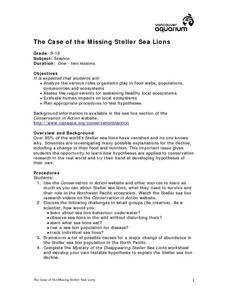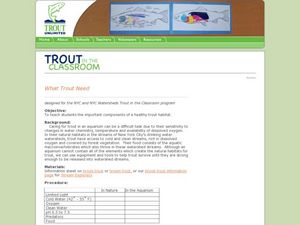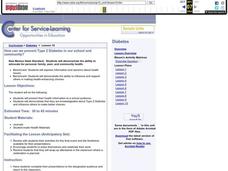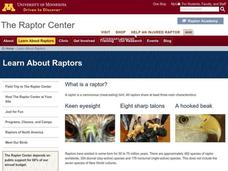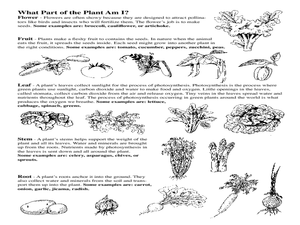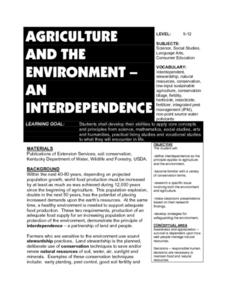Curated OER
House Bill No. 4097
Students identify healthy and unhealthy foods while considering a bill that would ban certain foods in schools. Through survey and discussion, they discuss a proposed legislative bill that would ban certain types of food in schools....
Curated OER
Behavior Assessment & Nutrient Needs
Students identify the factors that influence eating behaviors. They discover the nutrients that are needed in a teenager's body. They also identify the major food groups and examine the food pyramid.
Curated OER
How Well Will I Eat This Week?
Eighth graders develop a healthy menu for the coming week using Palm technology to develop healthy eating habits. They develop a spreadsheet for the seven days and for each menu using the Palm.
Curated OER
Keep that Zip! Nutrients: Zinc, Iron, Protein
Students explain the importance of zinc, iron and protein. In this biology lesson, students create a brochure containing information about the three nutrients. They share their brochure in class.
Curated OER
The Case of the Missing Steller Sea Lions
Students identify and analyze the various roles organisms play in food webs, populations, communities and ecosystems. Students assess the requirements for sustaining healthy local ecosystems. STudents evaluate human impacts on local...
Curated OER
Health and Immunization
Students research facts about Niger and Madagascar before reading a child's case study and answering questions about malaria prevention. They discuss healthy lifestyle, how bacteria and viruses can affect health and that following...
Curated OER
Tiny Bites: What Difference Could They Make?
Students explore how small "extra" bites of food can add significant calories to their diet. They estimate how many extra calories they add to their diets by just taking small bites of food throughout the day.
Curated OER
There Are Algae in Your House!
Young scholars demonstrate that, although we sometimes can neither smell nor taste them, many ingredients in our foods and household products come from the sea. They also investigate food eat to determine algae derivatives they contain.
Curated OER
What Trout Need
Students investigate the important components for a healthy trout habitat. In this fish habitat lesson, students discuss how the aquarium will simulate a trout's environment in nature. Students complete a trout information sheet to set...
Curated OER
Eat Your Sprouts Part I
Students will conduct a lab on the oxidation of an apple. The students will learn that the oxidation process can be halted when lemon juice is applied to the flesh of an apple because the lemon juice contains vitamin C, an antioxidant....
Curated OER
How Can We Prevent Type 2 Diabetes
Students summarize research they have conducted on Type 2 Diabetes. Students identify healthy lifestyle choices and set goals for their personal health. Students reflect on their research findings in a journal entry.
Curated OER
River Study
Students study physical features of a local stream. They study how to identify water features on topographic maps.
Curated OER
Goobers. Goobers? Goobers!
Students begin the activity by noting the many ways in which to use peanuts. In groups, they use the internet to research the work of George Washington Carver. They discover the allergies and nutritional information of the peanut and...
Curated OER
Laws of the Jungle
Students build a video game on predator-prey relationship. In this biology lesson, students identify the variables that affect this relationship. They write a short description and play each other's game.
Curated OER
Plant Party
Students identify plant parts. In this plants lesson, students bring in a vegetable. Each student classifies which part of the plant their vegetable comes from (flower, root, ect.) Students identify the parts of their vegetable and later...
Curated OER
Physical Activity and Energy
Does smiling take as much energy as running a lap around the track? Everything the body does requires energy. The more vigorous the activity, the more energy the body requires to perform the activity. Compare different low-energy...
Curated OER
Agriculture and the Environment
Students investigate the interdependence of agriculture and the environment. They research areas of interdependence and provide examples of situations where farmers are practicing conservation in the local area. Their findings are...
Curated OER
How Balanced Are You?
Help young learners look at energy in and energy out. Discuss how different activities may require different amounts of energy in. Use the included worksheet to have them write or draw pictures of what they ate in one day and what...
Curated OER
Animal Rights Vs. Animal Welfare - Understanding the Issue
Students explore the difference between animal rights and animal welfare. They take a field trip to a farm to explore the producing animals for human use. After researching and collecting information from animal welfare/rights...
Curated OER
Share Classroom Fat Data with Other Students
Students research eating habits in different places and in different cultures.
Curated OER
Math Nutrition
Fifth graders use nutritional knowledge to plan balanced meals and use grocery store flyers to calculate costs of the meals. They create word problems using these flyers.
Curated OER
Fit For Life: Eat Smart and Exercise
Students examine the problem of obesity among teenagers. They view a video and discuss what could be done to avoid becoming overweight. They also explore the importance of exercise.
Curated OER
Keeping Your Heart in Good Shape: What are the Benefits? - Biology Teaching Thesis
Learners name the main parts of the heart and what events occur there. They write a reaction that contains complete sentences, and uses proper spelling and grammar, after viewing a video. Students define the following terms: contraction,...
Curated OER
Dirty Mud
Students examine geological information to study benthic marine habitats. In this watershed project, students examine wetland habitats and land uses in a watershed. They will use geological information to discuss the impact of pollution...




